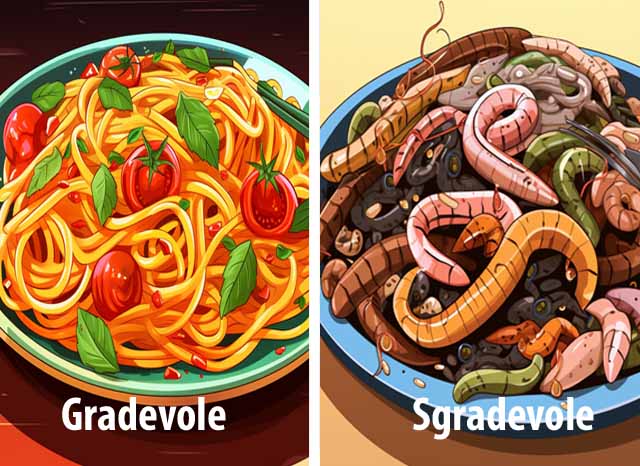
Come una lettera può cambiare tutto
Adding an ‘S’ to Italian Words: How One Letter Can Change Everything
Un piccolo prefisso, una grande trasformazione
A Small Prefix, a Big Transformation
La lettera “S” può davvero fare la differenza in italiano! Proprio come i prefissi “un” o “dis” in inglese che cambiano il significato delle parole, aggiungere una “S” all’inizio di alcune parole italiane può creare l’opposto o un significato negativo. È quasi magico come questa piccola lettera eserciti un potere così trasformativo.
The letter “S” can be a real game-changer in Italian! Much like how adding prefixes like “un” or “dis” to English words flips their meanings, placing an “S” at the beginning of certain Italian words can create the opposite or negative meaning. It’s almost magical how this small letter wields such transformative power.

La Ribelle Linguistica: La Magia della “S” in Italiano
The Linguistic Rebel: The Magic of “S” in Italian
Prendiamo, ad esempio, la parola “mascherato” (masked). Aggiungi una “S” davanti e voilà—diventa “smascherato” (unmasked). Questa piccola “S” si comporta come una ribelle linguistica, capace di ribaltare i significati e creare scompiglio.
Take, for example, the word “mascherato” (masked). Add an “S” at the front, and voilà—it becomes “smascherato” (unmasked). The little “S” acts like a linguistic troublemaker, flipping meanings and stirring things up.
Come funziona? How Does It Work?
Sebbene aggiungere la “S” possa invertire il significato di alcune parole italiane, non è una regola universale e non si applica a tutte le parole. Ad esempio:
While adding “S” can reverse the meaning of some Italian words, it’s not a universal rule and doesn’t apply to all words. For instance:
“Sbagliare” significa “to make a mistake,” ma non esiste la parola “bagliare.”
“Sbagliare” means “to make a mistake,” but there’s no word “bagliare.”
“Semplice” significa “simple,” ma “emplice” non esiste.
“Semplice” means “simple,” yet “emplice” doesn’t exist.
Ciò significa che, sebbene il trucco della “S” funzioni per molte parole, è importante consultare un dizionario o un madrelingua per garantire l’accuratezza.
This means that while the “S” trick works for many words, it’s important to consult a dictionary or native speaker to ensure accuracy.
Costruiamo la lista! / Let’s Build the List!
Ho iniziato a compilare una lista di parole italiane che cambiano significato quando si aggiunge la “S” come prefisso. Se conosci altri esempi, mi piacerebbe saperlo! I tuoi suggerimenti contribuiranno ad arricchire questa affascinante esplorazione del gioco linguistico italiano.
I’ve started compiling a list of Italian words that change their meaning when “S” is added as a prefix. If you know of more examples, I’d love to hear them! Your suggestions will help expand this fascinating exploration of Italian wordplay.

Venire (to arrive, come)
Mascherato (disguised, masked)
Chiudere (to shut)
Guardare (to watch intently)
Campo (field)
Bloccare (to block)
Comodo (convenient)
Parlare (to talk)
Corretto (correct)
—-—>
—-—>
—-—>
—-—>
—-—>
—-—>
—-—>
—-—>
—-—>
Svenire (faint, pass out)
Smascherato (revealed, unmasked)
Schiudere (to open)
Sguardo (to glance at quickly)
Scampo (escape, find safety)
Sbloccare (to unblock)
Scomodo (inconvenient)
Sparlare (to bad-mouth)
Scorretto (incorrect)

Conosciuto (well-known)
Accusa (accusation)
Perduto (lost, misplaced)
Drammatizzare (dramatize)
Doppiare (double)
Tranquillo (tranquilz)
Radicamento (rooting, embed)
Degnare (to dignify, deign to do)
Ingombrare (block, obstruct)
Costare (to cost, to require
—-—>
—-—>
—-—>
—-—>
—-—>
—-—>
—-—>
—-—>
—-—>
—-—>
Sconosciuto (unknown)
Scusa (excuse, pardon)
Sperduto (isolated, out of place)
Sdrammatizzare (downplay)
Sdoppiare (to split apart)
Squillo (ring, buzz)
Sradicamento (uprooting)
Sdegnare (refuse, reject)
Sgombrare (to remove, vacate)
Scostare (to push away)

Caricare (to load)
Crollare (to crumble)
Attaccare (to attach)
Fidare (to have faith)
Fiducia (Trust)
Condividere (to share)
Cremoso (creamy)
Creditare (to credit)
Fasciare (bandage, bind)
—-—>
—-—>
—-—>
—-—>
—-—>
—-—>
—-—>
—-—>
—-—>
Scaricare (to unload)
Scrollare (to shrug, to shake off)
Staccare (detach, separate)
Sfidare (to challenge)
Sfiducia (distrust)
Dividere (to divide)
Scremato (skimmed)
Screditare (to discredit)
Sfasciare (break, destroy)

Truccato (made up, disguised)
Coraggio (courage, bravery)
Vantaggio (advantage)
Fortuna (luck)
Fiorire (to flower)
Contento (content)
Natura (nature)
Ragionare (to reason)
Bucare (to puncture)
Invecchiare (to grow old)
—-—>
—-—>
—-—>
—-—>
—-—>
—-—>
—-—>
—-—>
—-—>
—-—>
Struccato (remove make-up)
Scoraggiare (to discourage)
Svantaggio (disadvantage)
Sfortuna (bad luck)
Sfiorire (wither)
Scontento (discontent)
Snaturato (unnatural)
Sragionare (to talk nonsense)
Sbucare (to pop out)
Svecchiare (modernize, update

Montare (assemble, build)
Gridare (to shout)
Bilanciare (to balance)
Frenato (brake)
Coinvolgere (to involve, engage)
Fatto (done, made)
Coprire (to cover)
Imballare (to pack)
Macchiare (to stain)
Piacere (to please
—-—>
—-—>
—-—>
—-—>
—-—>
—-—>
—-—>
—-—>
—-—>
—-—>
Smontare (disassemble)
Sgridare (To reprimand)
Sbilanciare (to unbalance)
Sfrenato (uncontrolled)
Sconvolgere (shock, disturb)
Sfatto (unmade)
Scoprire (to uncover, discover)
Sballare (to unpack)
Smacchiare (to remove stains)
Spiacere (to displease)

Legare (to tie)
Ricordare (to remember)
Apparecchiare (to set the table)
Avvitare (to screw a bolt)
Figata (fortunate, cool)
Voltare (turn, turn around)
Cambiare (change, switch)
Pensieroso (thoughtful, pensive)
Finito (finished)
Compilare (complete, fill out)
—-—>
—-—>
—-—>
—-—>
—-—>
—-—>
—-—>
—-—>
—-—>
—-—>
Slegare (untie)
Scordare (to forget)
Sparecchiare (clear table)
Svitare (unscrew a bolt)
Sfigata (unlucky, uncool)
Svoltare (change direction)
Scambiare (mistake, confuse)
Spensierato (carefree)
Sfinito (exhausted)
Scompigliare (confuse, muddled)

Inchiodare (to nail down)
Mentire (to lie, fib)
Vestire (to dress)
Comparire (appear)
Coretto (correct, right)
Commettere (commit, perpetrate)
Fuggire (escape, flee)
Apprezzare (value, esteem)
Apparire (to appear)
—-—>
—-—>
—-—>
—-—>
—-—>
—-—>
—-—>
—-—>
—-—>
Schiodare (pull out, pry open)
Smentire (contradict, prove wrong)
Svestire (to undress)
Scompare (disappear, vanish)
Scorretto (wrong, incorrect)
Scommettere (bet, gamble)
Sfuggire (elude, elope)
Spezzare (break, crack)
Sparire (disappear, vanish)

Gradevole (pleasant, agreeable)
Vampata (burst of heat)
Fuggire (escape, flee)
Torto (wrongdoing, mistaken)
Portello (door in a door, hatch)
Mettere (to place, to put)
Partire (depart, leave)
Innervare (stimulate)
Contare (count, rely on)
Torcere (wind, contort)
Forzare (force, coerce)
Tracciare (mark, trace)
—-—>
—-—>
—-—>
—-—>
—-—>
—-—>
—-—>
—-—>
—-—>
—-—>
—-—>
—-—>
Sgradevole (unpleasant, vile)
Svampito (die down, fade away)
Sfuggire (elude, elope)
Storto (sprain, bent, twisted)
Sportello (small door, car door)
Smettere (interrupt, quit)
Spartire (separate, split)
Snervare (draining, wearying)
Scontare (discount, prison time)
Storcere (sneer, twist, bend)
Sforzare (force, strain)
Stracciare (tear up, rip)
Oltre la “S” / Beyond “S”
L’italiano ha anche altri prefissi come “in,” “de,” “dis,” “di,” “ri,” e “im” per indicare il significato opposto o negativo di una parola. Questi prefissi seguono spesso regole specifiche, quindi sapere quando usarli è fondamentale per padroneggiare la lingua.
Italian also has other prefixes like “in,” “de,” “dis,” “di,” “ri,” and “im” to indicate the opposite or negative meaning of a word. These prefixes often follow specific rules, so knowing when to use them is key to mastering the language.
Amico (friend)
Fare (to make, to do)
Stabile (stable)
Felice (happy)
Ridere (to laugh)
Dire (to tell)
Condividere (to share)
Formare (to form)
Possibile (possible)
—-—>
—-—>
—-—>
—-—>
—-—>
—-—>
—-—>
—-—>
—-—>
Nemico (enemy)
Disfare (undo, unpack, dismantle)
Instabile (unstable)
Infelice (unhappy)
Deridere (to mock)
Disdire (to cancel)
Dividere (to divide)
Riformare (to reform)
Impossibile (Impossible)










